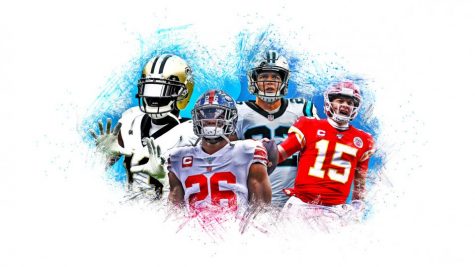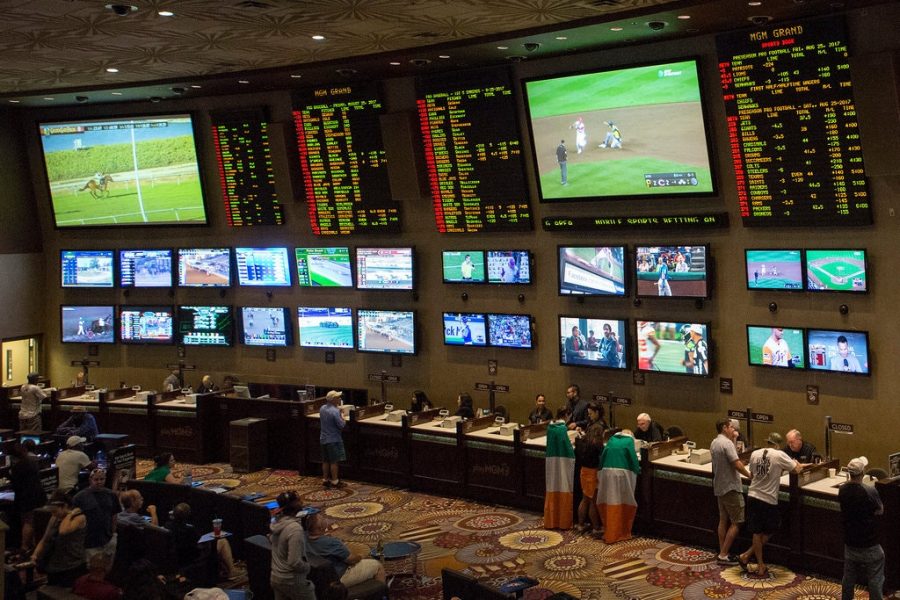The rise of fantasy football and sports gambling
“Once the major leagues in North America opened Pandora’s Box of gambling, there was no closing it…and there is no way to stop this freight train.”
Every year around September there is a recurring fad for many households in America. It is the return of football season. The return of football season is more than just lots of people tuning in to watch the games every week, but it is a lucrative time for people to get their analytics nerd on and play fantasy football. Fantasy football is something that not every football fan can get into, but it is one that draws a large audience, even more so in the past few years, where the sites have become more in tune with the analytical approach to the game.
 So what is fantasy football? Fantasy football is not even a real game. There is nowhere to actually watch it, nor is it a tangible thing. In fantasy football, players will draft a team of real players, and make a starting lineup based off of projections for their upcoming matchup. The fantasy football team owners have rosters consisting of around 16 (it can vary from league to league), and must make the decision to start or sit certain players. Depending on how well the player does in their game, the fantasy owners get a certain amount of points. Traditionally, six points are given out for touchdowns, and one point is given for every 10 yards. After all the games are played for the week, the owners’ points are tallied up, and if they have more than their opponent’s team does, they win the matchup. To simplify it, the owner is matched up with another owner in their league and the owner whose players accumulate the most points wins.
So what is fantasy football? Fantasy football is not even a real game. There is nowhere to actually watch it, nor is it a tangible thing. In fantasy football, players will draft a team of real players, and make a starting lineup based off of projections for their upcoming matchup. The fantasy football team owners have rosters consisting of around 16 (it can vary from league to league), and must make the decision to start or sit certain players. Depending on how well the player does in their game, the fantasy owners get a certain amount of points. Traditionally, six points are given out for touchdowns, and one point is given for every 10 yards. After all the games are played for the week, the owners’ points are tallied up, and if they have more than their opponent’s team does, they win the matchup. To simplify it, the owner is matched up with another owner in their league and the owner whose players accumulate the most points wins.
The whole concept of fantasy football can be a confusing one to some people. Why is it so fascinating? What makes it so great? Why are people spending so much time thinking about it? Those answers can vary, but for the most part, it is to flex their football knowledge on their opponents. Many leagues are made up of groups of friends who want to best each other, but also show them how much they know about football. This spirit of competition is often fueled by money as well. In many leagues across the world, there is a monetary prize for getting 1st place in a league, often making participants more eager to claim their spot at the top of the podium.
This begs the question, outside of bragging rights and money, what are the benefits of doing fantasy football? That can be answered when actually analyzing the NFL landscape as a whole. There are many consistently good teams in the League over the last 10 years, such as the Patriots, the Seahawks, the Steelers and the Packers. For fans of those teams, they always are in contention for a playoff berth, and their team is competitive enough to keep them engaged in the outcomes of the games. For fans of teams like the Jets, the Lions and the Browns, their teams are very often terrible, and are usually out of playoff contention by the middle of the season. This means that for fans of those teams, it becomes a “what now?” feeling. Their team is no longer competitive, which is probably really bad considering they are out of playoff contention, so a fan does not know what to do with the competitiveness that comes with football. The answer to this problem lies with making a team composed of players from across the league, giving them something to root for and making football season one that is worthwhile, and not just a reason to watch nine hours of television on Sundays.
The biggest source of profit, though, goes to the sports gambling websites, nicknamed “bookies.” They make money, no matter how much money they are claiming to be giving out. That is solely based on the way that potential big winnings motivate many Americans to unload hundreds, and even thousands, of dollars on particular bets.
This has created a boom in recent years for fantasy football and gambling sites. As gambling has become legalized in some states (Arkansas, Colorado, Delaware, Illinois, Indiana, Iowa, Michigan, Mississippi, Montana, Nevada, New Hampshire, New Jersey, New York, New Mexico, Oregon, Pennsylvania, Rhode Island, West Virginia, Washington, D.C.), it has become more common for websites to offer cash prizes to those who want to compete. This has drawn in millions of competitors to attempt to win more, hoping to make a fortune based off of their football knowledge. Sites like Draft Kings and MyBookie have all tried to cash in on this. These companies usually charge a low fee to enter, say $5 for example, and offer huge cash prizes that can start at $1,000 and end at $1,000,000. This draws in a lot of people to try their hand, which makes it so the website can make a profit. This is where the physiological aspect comes into play; these websites can have thousands of people enter a small investment and have a very low chance of winning. The website will collect their money, and only have to give out a prize to one winner. The return on this investment is a gold mine for sports gambling companies.

In recent years, sports have begun to become less wary of sports betting. For the longest time, no major sports league would go anywhere near anything that had to do with gambling. They thought they were at risk of polluting their fanbase, and being accused of rigging outcomes for monetary gain. This all changed in 2018, when sports gambling in New Jersey was deemed legal. Naturally, the NFL was the first to jump in on this experiment, beginning to gravitate to the capital of gambling, Las Vegas. The NFL started their alliance with the Sin City by allowing the Oakland Raiders to move from Oakland to Las Vegas. They also scheduled the 2020 NFL Draft (which got moved to an all virtual event) and the NFL is expected to announce Las Vegas as the location for the Super Bowl in 2025 or 2026. That seems so far in the future, but it is an olive branch from the league to the city. For the NFL to claim its stake in the city literally built from the ground up on betting is a tremendous step.
The NFL is not the only sports league getting in on the ground floor of sports gambling and fantasy sports. Both MLB and NBA have fantasy equivalents for their respective sports. They are obviously scored differently and have different formats, but it is the same premise. As far as sports gambling goes, both leagues work in tandem with betting sites and Vegas to maximize profits.
When the Nationals won their first World Series title in 86 years in 2019, the MLB allowed for live, in-game betting during the World Series. This was sponsored by Fox Bets, and it was the first time that betting was allowed during a World Series. The MLB additionally has a contract with MGM Resorts casino, a major betting outlet in Vegas, as the official betting partner of the MLB. The NBA was actually the first team to have an official betting partner, also with MGM Resorts. Also, the Denver Broncos of the NFL became the first team in the history of sports to announce a partnership with DraftKings, giving them an official gambling partnership.
These are all revolutionary for sports, but the question remains, is this even good for sports? The answer to this can be answered in two different fashions. The first is from the leagues’ perspective and the sports books’ perspective. They are gaining a massive amount of money from this, in fact the NFL brought in upwards of $1 billion during last year’s Super Bowl based on bets alone. In the past, the money would all go to the company, but now that leagues are taking part in this, it has become a gold mine for them, elevating the “bottom line” that owners and league commissioners strive so hard to raise. The second way is from a fan’s perspective, where it is also a great occurrence. There are more ways to win, even if one’s team is not doing very well. It keeps a fan engaged throughout the season, no matter how their team is doing, they still will be watching the games, looking for certain outcomes.
The arguments against sports betting are pretty straight forward: this makes the games very money oriented. There are beliefs that leagues will rig games, or force certain outcomes so they can get a specific matchup in the playoffs, say between two big market teams. This makes the game go away from how it should be, in their opinions. Also, people against sports betting argue that it can create gambling addictions, and that it can financially ruin individuals while companies are only benefitting; much like a tick creating disease and problems. Now, these opinions are justifiable, but in the end, there is no turning back from how it was in the past. Once the major leagues in North America opened Pandora’s Box of gambling, there was no closing it. This might be for the better, leagues will learn new ways to adapt, and even gain some fans that might not watch the games if they did not have money at stake. Once again, there is no turning back, and like Pandora’s Box, many things that come will be bad, it will probably make the NCAA dramatically change how they operate, and even drive some fans away from sports all together.
In the end, though, the pros outweigh the cons, and there is no way to stop this freight train.

Marc is a senior at South Lakes and is the Editor in Chief of The Sentinel. This is his 4th year on staff, and third as an editor. Outside of writing for...

















